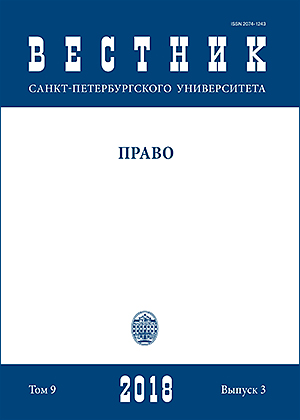The ratio of civil and criminal law regulation of property relations on the example of qualification of transactions, made under the influence of deception, violence and threats
DOI:
https://doi.org/10.21638/11701/spbu14.2018.308Abstract
The article deals with a comparative analysis of the regulation of property relations of civil and criminal law. The subject of the study is the legislation and judicial practice in terms of the qualification of transactions made under the influence of deception of violence and threats. As a result of the analysis, conclusions were drawn that transactions are outside the civil-law regulation of property relations if they are carried out concerning objects that are limited in a turnover or are a way of punishable infringement of another’s property. In cases where criminal-legal prohibitions are aimed at the protection of other relations (principles of lending, freedom of contract, the established procedure for carrying out entrepreneurial activities, etc.), the transactions concluded must be deemed valid and annulled in accordance with the procedure provided for by civil law. On the basis of examples it is possible to stipulate criteria for resolving the issue of when a transaction mentioned in the description of criminal conduct in a criminal law falls outside the scope of civil law regulation, and when it can be deemed valid can only be revoked based on the provisions of the Russian Civil Code. The actions of citizens and legal entities, executed in the form of transactions, are outside the Civil Law of property relations if they are carried out concerning objects (goods and services) that are limited in a turnover or are a way of punishable infringement of another`s property. In cases where criminal-legal prohibitions are aimed at the protection of other relations (freedom of contract, the established procedure for carrying out entrepreneurial activities, etc.), the transactions concluded must be deemed valid and annulled in accordance with the procedure provided for Civil Law.
Keywords:
civil law, criminal law, transaction, deception, fraud, violence, threats
Downloads
References
Downloads
Published
How to Cite
Issue
Section
License
Articles of "Vestnik of Saint Petersburg University. Law" are open access distributed under the terms of the License Agreement with Saint Petersburg State University, which permits to the authors unrestricted distribution and self-archiving free of charge.






